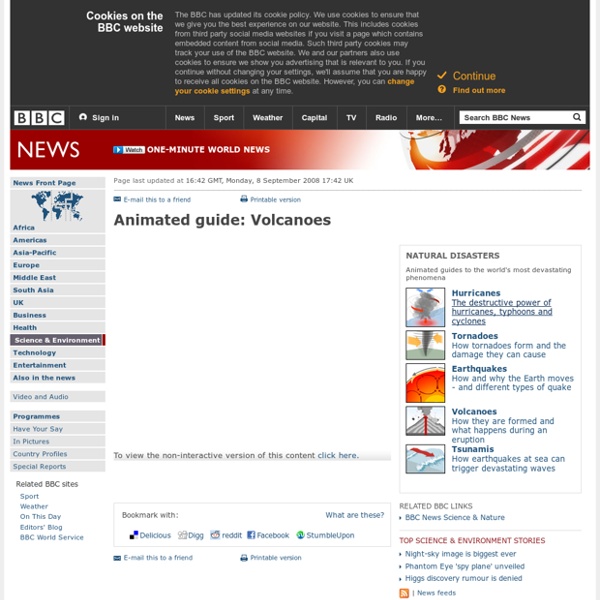



Introduction to Earthquakes Quiz Whiz: Volcanoes Back Next Quiz Whiz: What's on the Menu? Previous Quiz Whiz: The Moon Games Quiz Whiz: Volcanoes See how much you know about explosive mountains known as volcanoes. More Games African Animals Maze Game Quick Play Arctic Animal Memory Action Arctic Fox Snowboarding Animals Beaver Badminton Dive Deeper Hurricanes 101 - Ep. 3 More Freaky Forces of Nature Auroras, Snow Rollers, and Other Freakiness! Earthquake Lightning Tornado Many cave-dwelling fish don’t have eyes. More Curious Facts Volcanoes 101 - Ep. 13 More Giant's Causeway - Ep. 12 More Tornadoes 101 - Ep. 2 Hurricane Dolphin Diving x Show Link
Plate Boundaries Kung Fu What is a volcano? Introduction to volcanoes The earth's mountains, plains, plateaus, soils, rocks, etc. as we see it today is believed to have gone through many phases, with about 80% of it being carved out by the action of volcanoes. A volcano is simply a rapture (opening or vent) on the earth's surface (crust) through which molten magma (extremely hot mixture of gases, lava, ash and other burning substances) escape on to the earth's surface. How do Volcanoes look like? In May 1980, the Mountain St. Volcanoes occur at weak zones or points in the earth’s crust (including constructive and destructive boundaries). For history lovers… In A.D. 79 (really long ago) two Roman cities, Pompeii and Herculaneum, were completely buried in ash and dust in a matter of hours after a volcanic eruption. The word, ‘volcano’ was made out of the name of a Roman god of a small island in the Mediterranean sea of Sicily called ‘Volcan’. Now we shall see in a bit more detail how volcanoes come about.
History of deadly earthquakes Image copyright Getty Images Earthquakes have claimed hundreds of thousands of lives in the last 100 years, and improvements in technology have only slightly reduced the death toll. 25 April 2015 A 7.8-magnitude earthquake kills more than 8,000 people and leaves hundreds of thousands homeless, in the worst natural disaster to strike Nepal since 1934. 3 August 2014 Approximately 600 people are killed in a 6.1-magnitude earthquake that strikes Yunnan province in China. 15 October 2013 More than 200 people are reported to have died after a magnitude 7.2 earthquake strikes centrally-located Bohol and Cebu in the Philippines. 25 September 2013 More than 300 people are killed as a 7.7-magnitude quake flattens entire villages in Pakistan's remote south-western province of Balochistan, mainly in the district of Awaran. 20 April 2013 A powerful 6.6-magnitude earthquake kills at least 160 people and injured at least 5,700 in China's rural south-western Sichuan province. 11 August 2012 23 October 2011
Weather Wiz Kids weather information for kids Volcanoes (Volcanoes are not associated with weather, but instead are natural disasters.) What is a volcano?A volcano is a mountain that opens downward to a pool of molten rock below the surface of the earth. When pressure builds up, eruptions occur. Gases and rock shoot up through the opening and spill over or fill the air with lava fragments. Click Here to learn more about volcanoes from USGS. How are volcanoes formed? What are plate tectonics? Click Here to learn more about plate tectonics and the drifting of our continents. How many volcanoes are there? What are the different types of volcanoes? What is the difference between lava and magma? Why does lava take a long time to cool down? What is a pyroclastic flow? What is lahar? What is pumice? What is the largest active volcano? What is the Ring of Fire? When did Mount St. Click Here for more info on Mount St. Click Here to see an animation of an earthquake and the resulting tsunami. Know the Lingo Volcano Safety Tips Volcano Activities